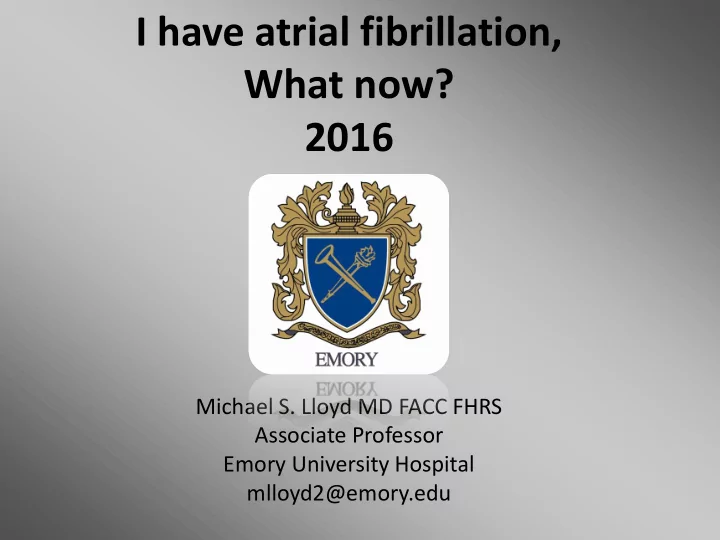

I have atrial fibrillation, What now? 2016 Michael S. Lloyd MD FACC FHRS Associate Professor Emory University Hospital mlloyd2@emory.edu
What exactly is Afib? Sinoatrial node Atrial depolarization Compact AV node Ventricular Repolarization Ventricular Depolarization QRS T wave Pwave PR 2
What exactly is Afib? http://www.blaufuss.org/SVT/index2.html
Why Me? Risk factors for developing AF Age over 60 Alcohol Weight Family history Sleep apnea Diabetes High Blood Pressure Valve problems Lung Disease **Long distance running Childhood second hand smoke Circulation. 2006;114:119-125
THERE ARE MANY TYPES OF ATRIAL FIBRILLATION! Lone atrial fibrillation, afib with no other known heart problems.
3- P’s OF ATRIAL FIBRILLATION! Paroxysmal, starting and stopping Persistent, requiring intervention Permanent, staying there
What Does That Mean for My Life?
A Stepwise Approach to Living With Atrial Fibrillation 1. What’s my risk for stroke? 2. Do I have symptoms? no 3. Do I feel better in normal rhythm? no yes Rate control (controlling Rhythm control (trying to the ventricle’s response to keep the atrium in regular the fibrillating atrium) rhythm
What can your doctor do? ablation medications pacemakers other devices
Make A Plan With Your MD Call your doctor if: You are usually in sinus rhythm, but have AF “attacks” for >12 hours You have an a very high heart rate at rest >140 bpm You are having symptoms of Afib after an ablation You are taking special rhythm medicines and are prescribed another prescription medicine.
Make A Plan With Your MD Go to the ER if: You are having signs of stroke, especially if not on blood thinners You are having emergency symptoms: severe shortness of breath severe chest pain worst headache of your life profuse bleeding
Make A Plan With Your MD Ask your doctor about: The pros and cons of other blood thinners Left atrial occlusion devices New ablation techniques pacemakers and AV node ablation
Figure out your stroke risk >2, blood thinner probably needed
What Can I Do To Live Healthy With Afib? 1. Weight 30 minutes at a time, five times a week 2. Diet/Exercise Reduce alcohol, reduce sodium 3. Sleep Exclude sleep apnea! 4. Education Know your heart rate and your BP!
Weight and Afib, What’s the Big Deal? Increases chance of diabetes Increases chance of high blood pressure Increases chance of sleep apnea
Weight and Afib, What’s the Big Deal?
Losing Weight Helps Afib
Diet and Afib
Diet and Afib
Diet and Afib
Sleep, Snoring and Afib
Sleep, Snoring and Afib People who didn’t have sleep apnea and got an Afib ablation People who DID have sleep apnea and got an Afib ablation, but DIDN’T use cpap
Exercise and Atrial Fibrillation
Exercise and Atrial Fibrillation People who were more active had a lower risk of atrial fibrillation! (Just don’t over -do it.)
Educating Yourself After 2-3 minutes of quiet sitting: 50bpm-100bpm With exercise: <150bpm
Educating Yourself https://www.hrsonline.org/ http://www.emoryhealthcare.org/arr hythmia/ask-experts-videos- arrhythmia.html
Wrap-Up There is more than one type of atrial fibrillation You can help manage Afib by attention to weight, exercise, sleep, and diet Get a plan with your doctor You can have a good quality of life with Afib, but keeping tabs on the pulse and your symptoms is key
Recommend
More recommend